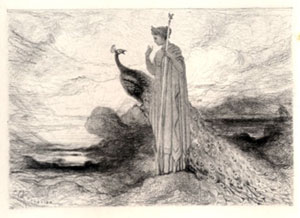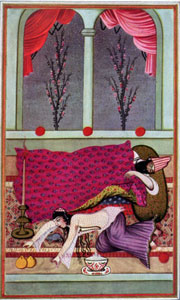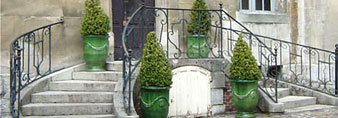THE PEACOCK COMPLAINING TO JUNO (II, 17)
The bird of Juno thus complained :
“ Goddess,” he said, “ I am constrained
To murmur at my own discordant note.
The song you gave my strident throat
Displeases nature round ;
Whereas the nightingale, that silly thing,
With lively notes of sweetest sound
Makes all the groves and valleys ring,
And bears away the honours of the spring.”
Juno in anger quick replied :
“ Peace, jealous bird ! does it to thee belong
To envy the poor nightingale his song ?
Thy neck with colours of the rainbow dyed,
Strutting in all thy varied silken pride !
Thy tail, where riches sparkle bright and vary,
Like the brave treasures of a lapidary !
There is no bird beneath the skies
So pleasing to admiring eyes.
No animals all gifts can claim,
Their qualities change with their name ;
Some big and strong you may behold,
Swift is the hawk, the eagle bold,
The raven bodes the near-approaching doom,
The crow forewarns of evils yet to come;
And all contented spread around their note.
Cease then complaining, or from tail to throat
I’ll strip thee, murmurer, of thy gaudy coat ! ” |

The Peacock complaining to Juno (Foulquier) |
THE CAT- METAMORPHOSED
INTO A WOMAN (II, 18)
A certain man intensely loved his cat :
She was a beauty, delicate and fat,
A darling, and quite gentle in her mew,
But he the greatest fool that e'er I knew.
By prayers and tears and magic art,
That softened fate's unbending heart,
One morn his cat, so sleek and staid,
Was changed into a lovely muid.
That very day our stupid calf
Made her his own and better half,
And was as mad in love now seen
As e'er he had in friendship been.
Ne'er did a lady, fair and free,
Charm her goodman so easily
As this young newly married wife
Gladdened his melancholic life.
He flattered her, she coaxing sat,
He nothing saw that looked like cat.
At last he said, erring as he began,
She is a woman, sure as I'm a man ;
When lo ! some mice who, gnawing at the mat,
Disturbed the couple as in bed they lay;
Out jumped the bride, the lovely cat.
She jumped in vain, the mice had fled away.
To bed again ; back came the mice,
She up and caught them in a trice.
They dreaded not the smallest harm,
Her altered shape caused no alarm.
And so through life for mite she ranged,
So hard is nature to be changed.
After long time the stuff retains its fold,
The vase its odour still will hold.
Beat, bruise, and cudgel, bellow, swear, and storm,
Nature defies such methods of reform‑
Caress and flatter, promise, praise, and cheer,
Nature's the same, and such will still appear.
You drive her out and bolt the doors in vain,
In at the windows she will jump again.
|

miniature iranienne : la chatte métamorphosée en femme |
|
THE LION AND ASS HUNTING (II, 19)
The King of beasts a fancy took to chase,
In celebration of his natal morn ;
His game was not the sparrow race,
But goodly boars, and stage with lofty horn.
He took the ass attendant on that day,
That he the better might succeed.
Sir Jack was of a wond'rous breed,
And had a Stentor's voice to bray.
The Lion posted him behind some boughs,
And bade him blow—assured that at this cry
The boldest beasts from out their lairs would fly.
They were yet unaccustomed to such noise,
And to his strong, tempestuous ass's voice ;
The horrid bray that filled the lonely wood,
Made all beasts run as fast as e'er they could,
And every one as he for nothing stayed,
Fell in the waiting lion's ambuscade.
“ Brayed I not well ? ” the ass said, “tell me, pray.”
He wished to have the honour of the day.
“ Yes, Jack, ” was the reply, “ well didst thou bray ;
Had I not know' thy person. and thy race,
I had myself been frightened in the chase.”
Jack, had he dared, had shown his anger here,
Although he well deserved the sneer ;
For who can suffer boasts to pass,
Above all from a bragging ass ? |
|
THE WILL EXPLAINED BY ÆSOP (II, 20)
If what is told of Æsop be not lies,
He was the oracle of Greece,
Wisdom was his alone.—To him were geese,
The Areopagus so wise.
That he was fit to be a judge, a leader,
A pretty story shall convince the reader.
A dying man, as is on record set,
Three daughters had to leave behind ;
A miser, drinker, and coquette,
Such was their different turn of mind.
He made his will, according to the laws,
Left them his wealth in equal portions shared ;
And by a certain clause,
A portion to his widow spared,
“ And payable by each,” the will declared,
“ When she her portion shall possess no more.”
The father died. And now without delay
Th' impatient females seize upon the will,
And o'er the contents eagerly they pore ;
But all in vain.—It was beyond their skill.
Again they tried his depth of thought to reach :
“ And payable,” it says, “ by each, ”
“ When she her portion shall possess no more.”
They were no wiser than before ;
For strange it seemed, as all must own,
To pay their mother when their wealth was gone.
What then could be their father's will ?
Lawyers were called and fee'd :—
The case they twisted, but it mocked their skill ;
They owned they could not comprehend the deed ;
Counselled the heiresses to share the spoil,
Nor longer for the meaning toil.
As to the widow's share, they said,
Such was the counsel's mind :
Let that by thirds be paid,
And as each sister is inclined ;
Each by a bond herself to this must bind :
Unless the widow yearly would be paid,
The year to count since he in earth was laid.
Things thus arranged, they formed three lots,
Three goodly shares ;
In one were feasting-houses, and such wares
As plate and china, pitchers, jugs, and pots,
And cupboards built beneath the trellised vine,
And cellars of the best of Malmsey wine,
And mouth-purveyors :—In two words to tell ye,
Ah the rich apparatus of the belly.
The next was the fair coquette’s share,
The town-house, furnished, exquisite, and new,
Hair-dressers, eunuchs, and embroiderers too,
Jewels, and silks, and gowns both rich and rare.
The third of farms and tenements consisted, The sheep, the shepherds, goats, and swine,
The ploughmen, oxen, bulls, and kine,
All the live stock that then existed.
Now all arranged, to give the parts by lot,
Might suit the sisters or might not ;
So each one chose from inclination,
And took her lot by valuation.
In ancient Athens happened this event,
And great and small, with open voice, Approved the portions and the choice. .
Æsop alone perceived that they,
These lawyers, with much trouble and delay,
In finding of the old man's testament,
Had spoilt the very gist of its intent.
“Ah I could the father,” said he, “ now arise !
What would he say to Attica, so wise ?
What ! we that boast our subtilty and skill,
To blunder thus on a testator's will ! ”
He spoke. And with the parts in view,
Portioned them out himself anew,
And to each sister gave the lot
Her taste and fancy could not bear :
The drinking stores the coquette got ;
Miss Bibberess had the cattle for her share ;
And to the avaricious lady fell
Hair-dressers, and the robes of price.
Such was the Phrygian's advice.
“ No surer means,” he said, “ to make them sell
Their several portions, and to marry well ;
Then pay their mother from the shining store,
When they possessed their father's wealth no more ;
According to the will.”
The people wondered at his skill,
And more, that he alone was found
Wiser than all the multitude around. |
|



